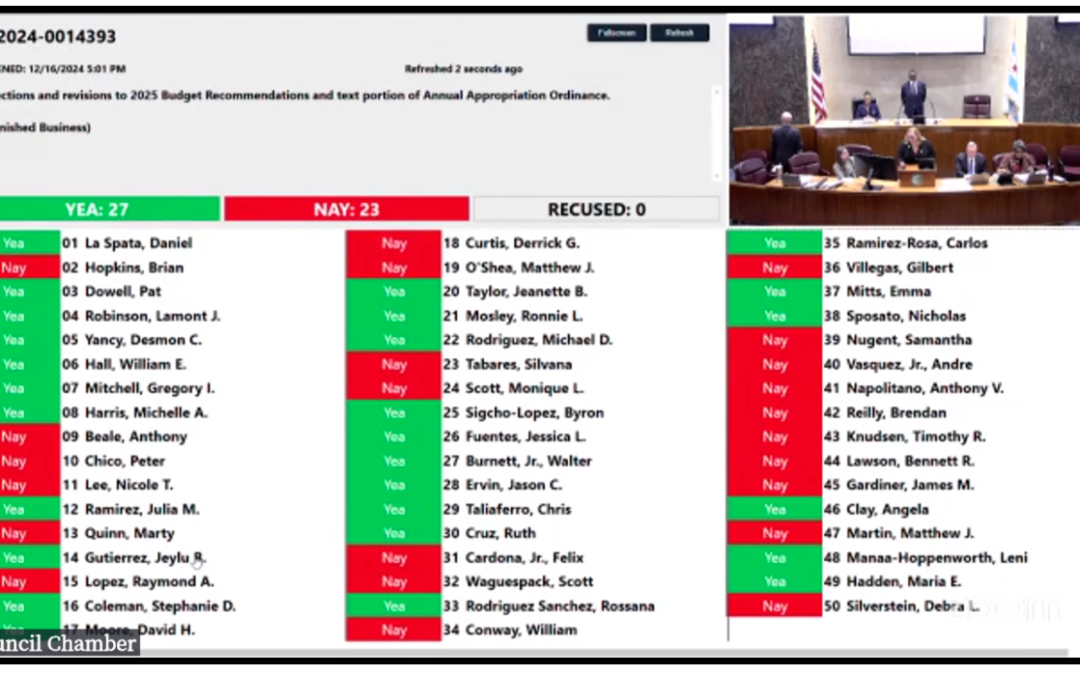After much deliberation, negotiation, and outreach to residents, yesterday I voted in favor of the FY2025 City of Chicago Budget, which now, thanks to my work and the efforts of like-minded colleagues, has NO property tax increase.
Chicago faces increased fixed costs associated with its pension obligations, debt service payments, and employee salaries (many of which are contractually negotiated with the unions). The FY25 Budget fulfills these financial responsibilities while maintaining the delivery of essential City services.
After rejecting the proposed $300 and $150 million dollar property tax increases as the primary way to meet those increased costs, I worked with the administration to identify a mix of spending reductions, budget reallocations, and fee adjustments to fill the budget gap. That included: eliminating 570 vacancies, over $460 million in programmatic/departmental cuts, increasing enforcement of parking and traffic violations, reducing the Mayor’s Office budget by $1 million, providing ticket amnesty, repurposing federal funds to fill the budget gap, increasing the tax on cloud computing services, and refinancing outstanding debt for savings. Every effort was made to identify alternative revenue sources and efficiencies so that a property tax increase could be avoided.
Notably, no tax on bottled water or groceries, or increases to the liquor tax were included in the budget. In addition, the City did not “skip” a $40 million payment on existing debt as some have stated. In order to meet our financial obligations for FY25, the City applied savings from a previous bond sale (which refinanced outstanding debt at a lower rate without extending the terms or amount borrowed) to this year’s budget gap instead of paying down another bond ahead of schedule.
Any further cuts to the budget would had to have come from services tied to departments and programs that are the most impactful to residents, such as: police manpower, streets and sanitation operations, transportation infrastructure maintenance, library services, public health programs, or similar critical City services. Those type of service reductions are not in the best interest of 3rd Ward residents.
Despite the financial challenges facing the City, this budget maintains these core City functions while expanding vital programs like youth jobs, community anti-violence initiatives, city-run mental health services, gender-based violence programs, police alternate response programs, and homelessness prevention. These are proven methods to address some of Chicago’s most pressing issues and are important priorities to uphold even through a difficult budget season.
While working on the budget, it also became clear that the City of Chicago can not meet its financial obligations alone. Other partner governments like the state, county, and federal government, and our City sister agencies, must step up to the table and invest in their Chicago constituents equally. Too much money flows from the City of Chicago outward, and is not kept here with the Chicago taxpayer. In this budget cycle alone, $40 million in City revenue was lost to a misunderstanding in Springfield. That could have put a sizeable dent in our initial budget deficit. That is on top of the chronic underfunding of our school, health care, infrastructure, and transportation systems from other governments. Chicago needs everyone to step up to the table and work together to ensure a brighter future for all our residents.
As I have done since I was first elected, I will continue to work to keep Chicago financially strong and ensure the services residents need are delivered at the lowest cost to taxpayers. That includes during next year’s budget cycle, which based on initial forecasts, promises to be just as difficult as the one we completed yesterday.
Unlike in years past though, my colleagues and I will be getting started analyzing and addressing the City’s budget in January instead of the traditional August/September start date. This will be aided by provisions included in the FY25 Budget Management Ordinance that guarantee aldermanic oversight and fiscal guardrails are included in the FY2026 Budget process. As these discussions begin, I will keep residents informed regarding our progress.

